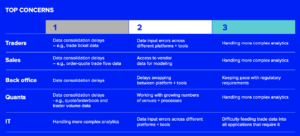Data and Technology Causing “Major Upheavals” In Banks: Refinitiv Survey
Posted by Colin Lambert. Last updated: February 21, 2023
A new survey from LSEG’s Refinitiv finds that much remains to be automated in FX workflows in banks, with workers often suffering from “app overload”. To meet this challenge Refinitiv says FX roles within banks “are undergoing major upheavals driven by data and technology”.
The findings come from a survey of 600 respondents equally spreads across the globe in a variety of FX roles across a range of organisation types. The survey finds that only 40% of trades are currently automated – on a related note recent Bank for International Settlements’ analysis of the Triennial Survey of FX Turnover suggests that 57% of FX volume is automated daily – which Refinitiv says means there is scope for the greater use of automation across not only mundane tasks but also more complex functions such as price discovery.
The majority of respondents believed that more trades will be executed automatically in the future, however, other functions, notably post-trade processes are also widely recognised as requiring increased automation in order to reduce operational and regulatory risks.
Asked which tasks could benefit most from access to new tools or ways of working, traders cited trade monitoring and execution more than those involving greater subjectivity such as quantitative research or the establishment of risk limits. Salespeople, who naturally have an interest in client behaviour, believed that client and venue analysis would benefit most from new tools, while respondents from the back office cited trade execution, confirmation and settlement – areas which continue to benefit from growing digitisation. Seventy-five percent of respondents in quants roles thought there was room for improvement in the sourcing of data from vendors and IT professionals felt that the development of models, automations and processes could see the most benefit.
Regarding the main issues encountered by individuals or members of their teams, respondents were most concerned about practical issues. Specifically, the survey finds that all respondent groups cite delays as a major hurdle. Both traders and salespeople said that they experienced consolidation and reconciliation delays, while salespeople had greater difficulty in accessing vendor data they required for analytics. Back-office respondents faced similar issues around data consolidation, as did quants, who cited this above the growing complexity of analytics.
Tech and IT functions, however, were most concerned about the need to handle increasingly complex analytics and about errors made when inputting data across different platforms.
The survey picks up on a key trend of the past two years, especially post-pandemic – the importance of automated and connected workflow. Responses across the board indicated that the need to automate is not confined to just one or two functions but spans the entire trade lifecycle. Post-trade processes are widely recognised as requiring a high degree of manual intervention, leaving organisations vulnerable to operational risk and, by extension, to counterparty and regulatory risks. Recent regulatory guidance has reinforced the need to automate back-office processes such as FX settlement and collateral management.
“It appears that new tools and systems should focus on easing tasks which are time-consuming but essential,” Refinitiv says. “The FX market needs faster, high-performance workflow tools which can consolidate data sources faster and support even more complex analytics.
“Productivity and efficiency can be vastly improved by using solutions which enable users to customise their workflows and easily access data and insights generated through the system,” it adds.
Almost all respondents identified delays in data source consolidation; input errors and data access were the issues most often encountered. Hold-ups occur while they wait for data to undergo regulatory and compliance checks. They also experience delays while consolidating proprietary data with third- party sources, especially when switching between platforms and tools. Inputting data from different platforms also adds to the likelihood of errors.

Source: Refinitv “The Evolution of FX – understanding the workflows of FX Professionals”
“Delays caused by data validation and compliance checks can be eliminated by adopting tools that allow for transparent, uniform data handling and efficiently perform regulatory and compliance checks,” Refinitiv says. “This would avoid unnecessary hold-ups and enable data to be delivered more quickly.”
Coding Demands
Only 4% of all respondents considered themselves to have an expert level of coding knowledge. As might be expected, those in tech/IT roles had the highest estimation of their own coding ability, with 77% of those describing their knowledge as expert/advanced, while 38% of traders also placed themselves in this category.
More than two-thirds of those surveyed described their coding skills as intermediate or lower, although 99% thought that coding skills were important or extremely important, with the workflows most likely to benefit, being the streamlining of reporting and keeping track of trades. Different organisations saw different benefits, however, brokerages saw gains in the collecting of trade data, both for compliance and wider tracking. Boutique banks saw the automation of manual workflows and improved efficiency as a major benefit. The survey revealed that the majority of organisations sponsor programming languages training for respondents, rising to 52% for their team and 37% for others in the organisation.
The survey also revealed a desire among respondents to become proficient in coding, with 47% of respondents claiming an ability to programme to a level at which it enhances their work, a further 47% currently learning and a further 5% wanting to start.
Seventy-one percent of respondents said they could use more advanced tools (which are not programming languages) such as specialist modelling platforms, advanced Excel macros or Power BI. JavaScript, Java and HTML5 were the most common programming languages with which respondents were familiar and they demonstrated a strong appetite to learn less common ones.
An industry-standard coding language with an English- like syntax such as Python makes it easier for people to learn to write and run programmes, and 54% of respondents said they would most like to learn Python, with employees of commercial banks showing a particular interest. VBA and MatLab were also cited, with 61% of respondents from digital banks showing an interest in learning the latter.
“Organisations need to promote the benefits of coding to all employees,” the report states.
Data Challenges
Responses to questions around interoperability were the most regionally varied in the survey. While market participants have access to more data than ever before, this data is typically siloed across multiple applications, meaning that users need to import and export data between different applications. “Not only is this process time-consuming – it also increases the risk of errors,” Refinitiv says.
Respondents were also using a wide variety of different internal and third-party apps simultaneously – most markedly in the APAC region and in investment banks. When it came to completing single tasks, EMEA and those working in commercial banks used the most apps.
“Although there is a wide variety of tools available to market participants, this proliferation often complicates workflows rather than simplifying them – as might be expected,” Refinitiv says. “FX professionals are often bogged down by a glut of systems, with people using nearly eight tools or systems simultaneously and an average of three or four tools at a time to complete a single task.
Importing data manually from multiple applications also means there is no “single version of the truth” when it comes to describing the data used within a model. This makes validation and compliance checks more difficult and constitutes a further example of delays caused by ensuring that data meets compliance needs.
“Lack of interoperability causes frustration and invariably acts as a barrier to greater operational efficiency,” the report states. “There is increasing demand for interoperable systems that enable users to import data seamlessly without the need to jump from one application to another.
“To avoid app overload, institutions should adopt technology that easily integrates with their existing systems and streamlines workflows,” it continues. “The ability to pipe data directly into frequently used applications such as Excel, for example, can save time, meaning that tasks will be completed faster and with less room for error.
Communication Preferences
Cultural preferences have a large influence on the way FX professionals communicate with their clients and with each other, the survey finds, adding, “Regional variations are surprisingly significant given the global nature of the industry – and differences can also be seen in role and organisation type.”
Messaging is about streamlining workflows. Flexibility of integration with a range of communication channels is an important consideration, particularly for those in sales or other client-focused roles.
When asked to what extent they expected regulatory changes to impact on their roles in the future, those in the Americas expected a lesser impact than in other regions. Those in APAC expected greater change, perhaps due to differing regulatory priorities in the region.
Investment banks expected regulation to have a greater impact on them than other organisation types. Traders and tech/IT teams also expected regulation to have a greater impact on their roles than other job functions. Tech/IT functions expected data privacy rules in particular to have an impact, however, high standard deviations across job role and organisation type point towards varied opinions between respondents with similar demographics.
Regional variation was also pronounced, with respondents in EMEA most concerned with IFRS9 and those in the Americas concerned mainly with record-keeping. There were also notable regional differences in attitudes towards climate and ESG regulations, with respondents in EMEA showing the most concern. This can probably be attributed to EU initiatives.
“In short, however, while new regulations were expected to have some effect on roles, it was more limited than might have been expected,” Refinitiv says.
While respondents acknowledged that regulation is likely to have an impact on their roles in the future, the effect is not expected to be dramatic. Data privacy, record-keeping and clearing were cited as key regulatory areas they needed to meet.
The survey found both quantitative analysis and machine learning (ML) are used widely, though for a variety of different tasks. More tedious tasks such as order execution or clearing and settlement are more likely to benefit from the use of ML, but its main use is in making efficiency gains. Asked which factors will become more important in the next two years in driving the use of quantitative analysis and ML, 54% of respondents cited the management of increasing amounts of transaction or market data.
Looking to the future of their own roles, skills in automation were viewed as the most important for respondents to acquire overall. Risk management skills, which might have been expected to be the foremost category, were mostly cited by mid- and back-office teams rather than by traders, who perhaps do not consider risk management to be a front-office concern.
When asked how they saw their roles evolving over the next five years, most respondents expect to dedicate more time to compliance. They also expect that more trades will be conducted automatically and that more back-end processes will be automated.




